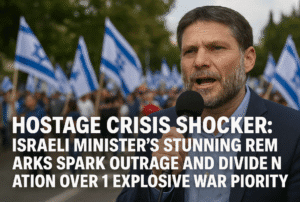Hostage Crisis Shocker: Israeli Minister’s Stunning Remarks Spark Outrage and Divide Nation Over 1 Explosive War Priority
Israeli Finance Minister Bezalel Smotrich’s comments prioritizing the dismantling of Hamas over rescuing hostages have sparked significant controversy and exposed a deep division within the Israeli government. His remarks, which downplay the urgency of freeing hostages, have faced harsh criticism from families of the captives and public protests, highlighting the ethical dilemma of balancing military objectives with humanitarian concerns.
The ongoing war has claimed over 50,000 Palestinian lives and left many hostages still in captivity, with Israel’s military operations facing challenges in securing their release. Prime Minister Netanyahu’s reliance on far-right allies, coupled with the stalled cease-fire negotiations, complicates any path toward a resolution. U.S. Ambassador Mike Huckabee’s appointment further shifts support toward aggressive tactics, raising fears of prolonged conflict.
The debate underscores the fractures within Israeli society, with growing concerns over the war’s indefinite duration and its impact on both national unity and regional stability. Balancing military victory with humanitarian priorities remains a defining challenge for Israel’s future.

Hostage Crisis Shocker: Israeli Minister’s Stunning Remarks Spark Outrage and Divide Nation Over 1 Explosive War Priority
A controversial statement by Israeli Finance Minister Bezalel Smotrich has reignited tensions over the government’s wartime objectives, exposing a rift between the pursuit of military victory and the urgent demand to rescue hostages held by Hamas. Smotrich, a far-right leader, asserted in a radio interview that freeing hostages was not Israel’s “most important goal,” emphasizing instead the need to dismantle Hamas’s governance of Gaza. His remarks have drawn sharp criticism from hostage families and underscored the ethical and strategic dilemmas facing Israel as the war stretches into its 18th month.
The Clash of Priorities
Smotrich’s comments reflect a hardened stance within Prime Minister Benjamin Netanyahu’s coalition, which has prioritized the destruction of Hamas over negotiated solutions. While the government initially vowed to both eliminate Hamas and secure the hostages’ release, progress on either front remains elusive. Over 50,000 Palestinians have been killed in the conflict, according to Gaza health officials (who do not distinguish between combatant and civilian deaths), and Hamas continues to wage a guerrilla-style insurgency. Meanwhile, more than 36 hostages have reportedly died in captivity or during Israeli operations, with over 30 bodies and two dozen living captives still believed held in Gaza.
The Hostages Families Forum, representing affected families, accused the government of abandoning its citizens, stating leaders had “consciously decided to give up on the hostages” to prolong the war. Public pressure is mounting, as seen in recent Tel Aviv protests where crowds chanted, “All of them home now!”—a plea highlighting the deep cultural value Israel places on retrieving its citizens.
Netanyahu’s Balancing Act
Prime Minister Netanyahu has walked a tightrope, vowing “ultimate victory” while dismissing calls for a cease-fire as “Hamas propaganda.” His reliance on far-right allies like Smotrich, who advocates for reestablishing Israeli settlements in Gaza, complicates efforts to negotiate hostage releases. Hamas has demanded a permanent cease-fire and prisoner swaps, terms Israel rejects.
The collapse of a U.S.-backed truce in March 2024—which freed 25 hostages and 1,500 Palestinian prisoners—deepened distrust. Israel blamed Hamas for the breakdown, resuming airstrikes and ground operations. Critics argue that without a diplomatic strategy, military action alone risks perpetuating a cycle of violence without guaranteeing Hamas’s defeat or the hostages’ return.
U.S. Role Shifts Under New Ambassador
The political landscape further shifted with Mike Huckabee’s appointment as U.S. Ambassador to Israel. A vocal evangelical leader and former Arkansas governor, Huckabee has long supported Israeli settlement expansion and questioned Palestinian statehood. His alignment with Israel’s right-wing factions could signal stronger U.S. backing for aggressive military tactics and West Bank annexation, diverging from prior administrations’ calls for restraint.
Huckabee’s stance—rooted in theological support for Jewish claims to biblical lands—raises concerns among Palestinians and international observers. His influence may embolden figures like Smotrich, who view Gaza’s future through a lens of territorial control rather than diplomacy.
Broader Implications
The debate over hostages versus military objectives reveals deeper fractures in Israeli society. While some view Hamas’s eradication as essential to long-term security, others argue that abandoning hostages undermines national solidarity. The government’s refusal to prioritize negotiations risks alienating families and allies, even as Hamas retains leverage through its captives.
For Gaza’s 2.3 million residents, the war’s prolongation means continued devastation. Reconstruction is impossible under ongoing bombardment, and Hamas’s entrenchment in civilian areas perpetuates a deadly stalemate. Regional stability hangs in the balance, with potential escalation involving Hezbollah in Lebanon and Iranian proxies.
Conclusion: A Path Forward?
Smotrich’s remarks underscore a painful truth: Israel’s war aims may be mutually incompatible. Destroying Hamas could require years of conflict, jeopardizing hostages and international support. Conversely, a cease-fire might leave Hamas intact, failing to address Israelis’ security fears.
The solution likely lies in a recalibrated approach—pairing targeted counterterrorism with earnest negotiations, backed by international mediators. For hostage families, every moment counts. As one protester’s sign read, “Victory means bringing them home alive.” Balancing humanity with strategy remains Israel’s greatest challenge—one that will define its moral and geopolitical trajectory long after the guns fall silent.
You must be logged in to post a comment.